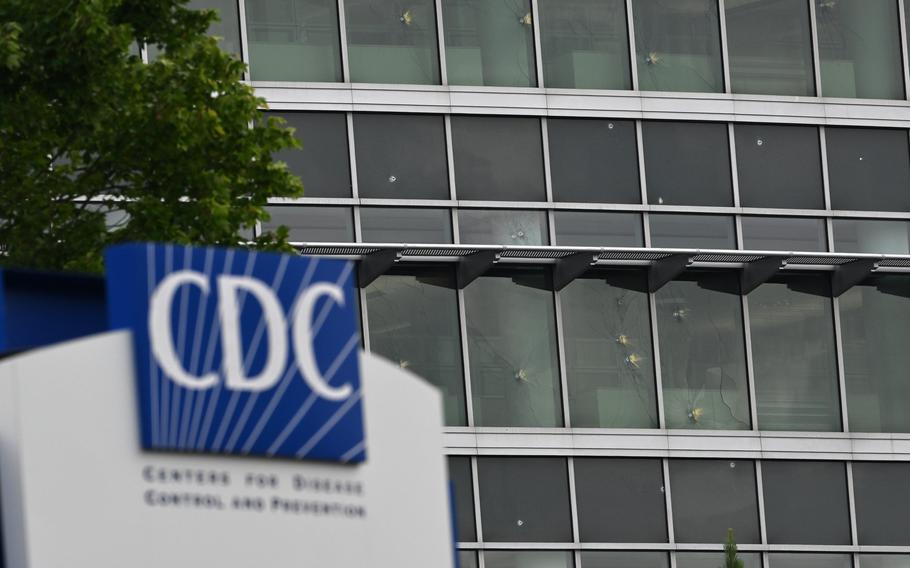
Bullet holes are visible in a CDC building in Atlanta on Aug. 9, 2025, after a deadly shooting the day before. (Hyosub Shin, The Atlanta Journal-Constitution/TNS)
The horrifying attack on the Centers for Disease Control and Prevention’s Atlanta headquarters felt like the grimly predictable result of years of pandemic-related misinformation and disinformation — much of it propagated by the very people now leading U.S. health agencies.
It’s no surprise, then, that instead of offering a concrete plan to protect staff and rebuild public trust, Health and Human Services Secretary Robert F. Kennedy Jr. seized the tragedy as another opportunity to double down on his dangerous rhetoric.
On Aug. 8, CDC workers huddled together in offices as a gunman — struggling with his mental health and angry about COVID vaccines — fired nearly 500 rounds, with about 200 striking buildings on the agency’s campus, police said Tuesday. DeKalb County police officer David Rose was killed while responding to the attack, and the shooter took his own life.
Over the weekend, Kennedy offered condolences for the slain officer, and in an email to CDC staff obtained by The Washington Post, he praised the importance of their work: “From public health labs to data systems to community programs, your efforts matter,” he wrote. By Monday, however, he was on television using the platform to denigrate yet again and undermine those efforts.
President Donald Trump, meanwhile, has said nothing publicly about this assault on a major federal institution.
According to neighbors, the gunman believed the COVID vaccine was responsible for his health problems. And police confirmed on Tuesday that he left behind writing that “expressed the shooter’s discontent” with the shots.
But when a reporter from Scripps News asked Kennedy about HHS’ plans — in light of the shooting — to counter vaccine misinformation, he turned the spotlight back on health agencies themselves. He accused the government of overreach and lying during the pandemic, claiming that this, not conspiracy theories or falsehoods, was the actual reason people had lost faith in the mRNA vaccines and health leadership.
“We have to ask, ‘Why are people not believing the public health agencies?’ And the answer I think is pretty elementary: that the public health agencies have not been honest,” he said.
In the same interview, Kennedy defended his recent decision to abandon investment in mRNA vaccines — a move decried by scientists and doctors as leaving the U.S. dangerously vulnerable to current and future threats — with what amounted to another swipe at the CDC. “We were told during COVID, ‘Trust the experts,’ but ‘trust the experts’ is not a feature of either science or democracy. It’s a feature of totalitarianism and of religion.”
It’s true that in the early stages of the pandemic, public health leaders kept their message simple: get vaccinated for yourself and for the greater good. Over time, that lack of nuance created, for some, a troubling disconnect when their lived experience didn’t align with the threat level they were told justified sweeping pandemic-era policies. Yet the danger was real — the U.S. experienced daunting waves of deaths and hospitalizations — as was the efficacy of the vaccine, which saved millions of lives.
But that’s a communication problem, not an expertise problem. Kennedy, meanwhile, conveniently neglects to mention that he and nearly everyone he chose for leadership roles at HHS were responsible for the erosion of trust. The current hostility toward the CDC is a direct result of his constant drumbeat of falsehoods about the COVID shot, which he has called the “most dangerous vaccine ever made,” and the agency itself, which he once likened to a Nazi death camp.
He continues to spread misinformation about the safety of the vaccine and the body of data to support it. Now, he’s using his position and the mistrust he fueled among some Americans to justify the dismantling of our public health protections — whether through abandoning mRNA research, dismissing the CDC’s expert vaccine panel, or unilaterally changing recommendations on shots.
Even before the shooting, the CDC was under siege from Kennedy’s program and staffing cuts, and challenges to its expertise. Now, many employees feel abandoned by this administration — traumatized, even.
In her first all-staff meeting on Tuesday, newly confirmed CDC Director Susan Monarez offered little beyond platitudes. “We know that misinformation can be dangerous not only to health, but to those that trust us and those we want to trust, and we need to rebuild that trust together,” Monarez said, according to Bloomberg News. “That trust is what binds us in moments like this.”
But it’s hard to know where to go from here — at least with Kennedy leading HHS. CDC scientists have stood on the front lines against public health threats; now they increasingly find themselves the targets. Unfortunately, no one in this administration seems willing — or able — to defend them, and that puts all of us at risk.
Lisa Jarvis is a Bloomberg Opinion columnist covering biotech, health care and the pharmaceutical industry. Previously, she was executive editor of Chemical & Engineering News. This column reflects the personal views of the author and does not necessarily reflect the opinion of the editorial board or Bloomberg LP and its owners.